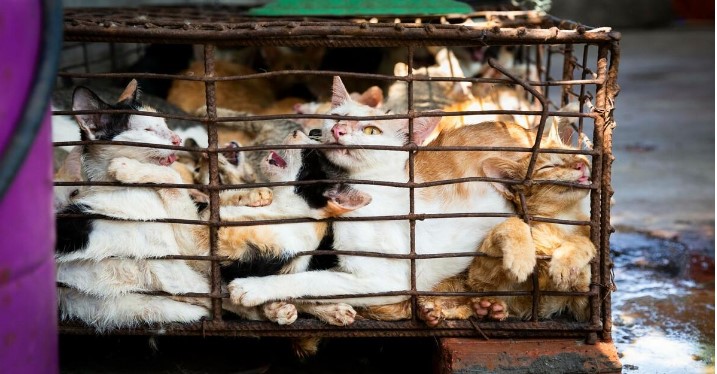In a landmark move, the European Commission has unveiled a comprehensive set of proposals aimed at enhancing pet welfare standards for cats and dogs within the European Union. The initiative, disclosed on December 7th, not only addresses the pressing need for a unified framework but also takes substantial strides in curbing illegal activities like puppy trading. This article explores the key aspects of the proposal, highlighting the significance of these measures for both animals and humans.
Closing the Legislative Gap:
Despite existing provisions safeguarding dogs and cats in specific contexts, such as scientific breeding or non-commercial transport, the EU has long lacked a cohesive framework for pets. The newly introduced rules seek to fill this legislative void, establishing minimum common welfare standards for breeding and keeping pet animals. This step marks a crucial development in ensuring the well-being of pets across the EU.
Enhancing Traceability:
One of the notable features of the proposal is the emphasis on improving the traceability of dogs and cats, especially in online transactions. The rules mandate the use of electronically-readable transponders for all pets before they are put on the market. This measure not only discourages fraudulent activities but also enables better monitoring of the animals’ welfare conditions. Advocates, including Reineke Hameleers, CEO of Eurogroup for Animals, applaud this move and stress the need for interoperable national databases to ensure effective implementation.
Ban on Inhumane Practices:
The Commission’s proposal includes a Europe-wide ban on painful practices like ear cropping and tail docking, practices still permitted in a few member states. This crucial step aligns with the EU’s commitment to fostering a humane environment for pets. EU Health and Animal Welfare Commissioner Stella Kyriakides underlines the importance of establishing common goals for breeders and sellers, a sentiment echoed by citizens demanding change.
Impact on Commercial Breeders:
The proposed rules are anticipated to affect around 24,000 to 30,000 commercial dog breeders and 8,000 to 10,000 commercial cat breeders. This shift towards standardized welfare practices is poised to create a more level playing field among operators in the pet market across the Union, fostering a healthier environment for both pets and those involved in their breeding and sales.
Implications for Commercial Breeders:
Commercial dog and cat breeders will undoubtedly experience a shift in their operations with the proposed regulations. The move towards standardized welfare practices and the prohibition of certain procedures will likely impact breeding practices, prompting breeders to reassess their methods. While some may face challenges in adapting to these changes, the long-term benefits for both animals and consumers cannot be overstated.
Establishing a level playing field among operators in the pet market not only promotes fair competition but also sets a precedent for responsible breeding practices. Breeders adhering to high welfare standards are likely to gain favor with conscientious consumers, thereby influencing market dynamics and fostering a culture of ethical pet ownership.
Human Health Considerations:
The link between pet welfare and human health is a focal point in the Commission’s proposal. The lack of proper traceability and vaccination poses a serious risk for the transmission of zoonoses, including rabies and echinococcosis, thereby impacting public health. Addressing this concern underscores the holistic approach the EU aims to adopt in safeguarding the well-being of both pets and their owners.
Parliamentary Advocacy and Public Health Risks:
The call for comprehensive legislation on pet welfare gained momentum in 2020 when the European Parliament passed a resolution urging the Commission to implement a harmonized system for the identification and registration of cats and dogs. This legislative push was further reinforced by MEPs from the European People’s Party (EPP), highlighting the risks posed by illegal puppy trading to both animal welfare and public health. German MEP Peter Liese emphasizes the potential transmission of diseases through the lack of proper vaccination and treatment, signaling a collective stance against the illicit activities of certain breeders and operators.
Global Repercussions:
The EU’s proactive stance against illegal pet trade from non-EU countries carries global significance. By setting stringent standards for imports, the EU sends a clear message to nations engaging in substandard welfare practices. The proposed regulations aim to counteract fraudulent activities such as fake health certificates and falsified pet passports, establishing a framework that prioritizes the well-being of animals over profit.
This global perspective emphasizes the interconnectedness of the pet trade and the need for international cooperation. The EU’s endeavor to compile a list of approved countries and establishments reflects a commitment to encouraging global adherence to high pet welfare standards. Such initiatives can potentially inspire other regions to adopt similar measures, creating a ripple effect towards improved global pet welfare.
Addressing Online Sales and Imports:
The surge in online sales of pets, accounting for approximately 60% of transactions, prompted the EU to address this avenue in the proposed rules. While only a handful of member states currently regulate online sales of dogs and cats, the new traceability system will leverage the Digital Service Act (DSA) to ensure accountability in online commerce. Additionally, the Commission is keen on curbing illegal pet trade from non-EU countries, recognizing the need for equivalent welfare standards for imports from nations like Serbia, Belarus, Russia, and Türkiye.
Conclusion:
The European Commission’s proposal on pet welfare represents a significant leap forward in ensuring the humane treatment of cats and dogs across the EU. By closing legislative gaps, enhancing traceability, and imposing bans on inhumane practices, the EU aims to create a comprehensive framework that prioritizes the well-being of pets and addresses public health concerns. As these proposed rules navigate the legislative process, they mark a pivotal moment in shaping a more compassionate and responsible approach to pet ownership within the European Union.

